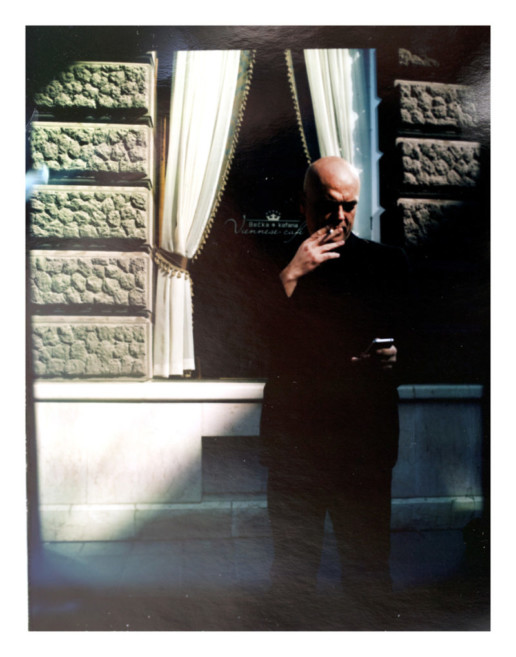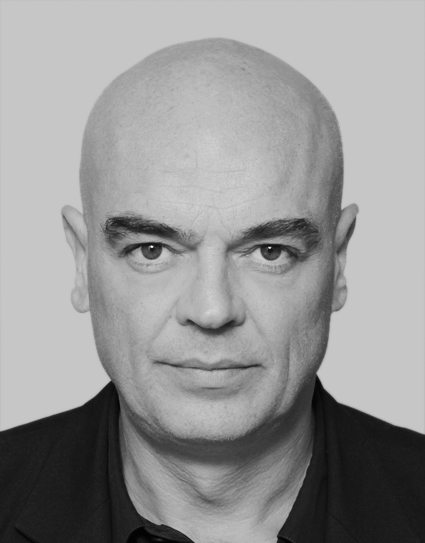Rémy Ourdan is a journalist, war correspondent for the newspaper Le Monde, currently covering the war in Ukraine.
Rémy Ourdan est un journaliste, correspondant de guerre au journal Le Monde, qui couvre actuellement la guerre en Ukraine.

Rémy Ourdan began as a reporter in 1992 in besieged Sarajevo. He covered the siege of Sarajevo and the Bosnian war for four years, first as a freelance correspondent for radio stations, then from 1994 as a correspondent for Le Monde newspaper. He stayed to live in Sarajevo one more year after the war.
He then went to Rwanda and wrote a long investigative story on the Tutsi genocide. In Africa, he also covered conflicts in the Great Lakes region and in Congo, as well as the Eritrean-Ethiopian war and the Sierra Leone civil war.
He covered the rise of the international criminal justice and the trials for crimes against humanity and war crimes at the International Criminal Tribunal for the former Yugoslavia in The Hague and the International Criminal Tribunal for Rwanda in Arusha.
He came back in the former Yugoslavia in the late 90’s for the Kosovo war and for the fall of Slobodan Milosevic in Serbia. He closed the decade of yugoslav conflicts with the arrest of Milosevic in Belgrade and his transfer to The Hague for his trial, and with an account of his journey through ex-Yugoslavia with Svetlana Broz, granddaughter of Tito, in search of “Yugo-nostalgia”.
Covering the second Intifada in the Israeli-Palestinian conflict, he investigated the destruction of the Jenin refugee camp.
After the September 11 attacks in 2001, Ourdan covered the American wars in Afghanistan and in Iraq, and worked on al-Qaeda and global jihad. He entered Kabul with the mujahideen (2001) and was in Baghdad during the American-led invasion of Iraq (2003). In Iraq, where he lived for two years, he investigated the American war crimes committed during the invasion and the torture and prisoner abuse committed during the occupation, as well as the Fallujah sunni insurgency.
He has been Le Monde foreign editor (2005-2008).
Apart from going back to Afghanistan and Iraq, Ourdan then covered the Arab uprisings and the Libyan civil war, the Mexican drug war and the maras gangs in Central America, the war in the Central African Republic, the conflicts involving the Islamic State (Daesh) – including the battle of Mosul -, the political crisis in Venezuela, the deportation of the Rohingya from Myanmar, the war in Nagorno-Karabakh…
Rémy Ourdan still covers armed conflicts, as well as post-war, human rights and international justice issues.
Since the Russian invasion in February 2022, he is covering the war in Ukraine.
—–
Rémy Ourdan additionally continues a long-term work on Sarajevo and memories of war, either for commemorations in Bosnia, for a story on twenty years of international criminal justice when Ratko Mladic was sentenced, or for a story about love in wartime, or a series entitled “Sarajevo-Jérusalem” on tolerance and dreams of coexistence.
Ourdan organized on April 6, 2012, for the 20th anniversary of the war in Bosnia, a reunion called “Sarajevo 2012” for which hundreds of war reporters came back to Sarajevo. He published on that occasion, with Jon Jones and Gary Knight, the photo book “Bosnia 1992-1995”.
Ourdan is a co-founder and was the first director (2012-2019) of the WARM Foundation on contemporary conflicts, based in Sarajevo.
—–
Rémy Ourdan wrote forewords and various stories for collective books, including “Après-guerre(s)” (Autrement, 2001), VII “WAR” (de.MO, 2003), Dispatches “Beyond Iraq” (2008), “Bosnia 1992-1995” (2012), “Robert Capa” (Reporters Sans Frontières, 2015), “Chris Marker. La trilogie des Balkans” (Arte Editions, 2016), Zérane Girardeau “Déflagrations” (Anamosa 2017 & Lienart 2021), Bruno Philip “Aung San Suu Khi, l’icône fracassée” (Les Equateurs, 2017), “Les mutations de la justice internationale ?” (Pedone, 2018), “Patrick Chauvel” (Reporters Sans Frontières, 2022).
His reports were published in collection books about Le Monde, “Le Monde, les grands reportages 1944-2009” (Les Arènes, 2009) and “Le Monde, les grands reportages 1944-2012” (Pocket, 2012).
—–
Ourdan is the author and director of the documentary film “The Siege” (co-directed with Patrick Chauvel, Agat Films & Cie / Pro.ba / Arte / INA, 2016).
—–
Rémy Ourdan is the author of the exhibitions “The World of 9/11” (co-curated with Stéphane Grimaldi, Caen Memorial, 2021), and “Traces of Humanity” (co-curated with Damir Sagolj, Bayeux Awards for War Correspondents, 2021 & Bosnian Cultural Center, Sarajevo, 2022).
—–
Ourdan was awarded the Bayeux-Calvados Awards for War Correspondents 2000 for a story on the war in Sierra Leone, the Bayeux-Calvados Awards for War Correspondents 2012, Ouest-France/Jean-Marin Prize, for a story on the Mexican drug war in Ciudad Juarez, and his film “The Siege” received various awards including the Gold FIPA for Best Documentary 2016.
Rémy Ourdan a commencé sa vie de reporter en 1992 en partant vivre dans Sarajevo assiégée. Il a couvert le siège de Sarajevo et la guerre de Bosnie durant quatre ans, d’abord en freelance pour des stations de radio, puis, à partir de 1994, comme correspondant du journal Le Monde. Il est resté vivre à Sarajevo la première année de l’après-guerre.
Il est ensuite parti au Rwanda et a écrit une longue enquête sur le génocide des Tutsis. En Afrique, il a aussi couvert les conflits de la région des Grands Lacs et au Congo, la guerre Érythrée-Éthiopie et la guerre civile en Sierra Leone.
Parallèlement à ses reportages de guerre, il a suivi l’émergence d’une justice internationale et les procès pour crimes contre l’humanité et crimes de guerre du Tribunal pénal international pour l’ex-Yougoslavie de La Haye et du Tribunal pénal international pour le Rwanda d’Arusha.
Il est revenu en ex-Yougoslavie à la fin des années 1990 pour la guerre au Kosovo, où il est entré clandestinement par les montagnes, puis pour la chute de Slobodan Milosevic en Serbie. Il a clos cette décennie de conflits yougoslaves par l’arrestation de Milosevic à Belgrade et son transfert à La Haye pour son procès, et par un récit de son voyage à travers l’ex-Yougoslavie avec Svetlana Broz, petite-fille de Tito, à la recherche de la “yougo-nostalgie”.
Envoyé couvrir le conflit israélo-palestinien pour la seconde Intifada, il a notamment enquêté sur la destruction du camp de réfugiés de Jénine.
Après les attentats du 11 septembre 2001, il a couvert les guerres d’Afghanistan et d’Irak, et a travaillé sur al-Qaida et le djihad international. Il est entré avec les moudjahidin dans Kaboul (2001) et était à Bagdad pendant l’invasion américaine de l’Irak (2003). En Irak, où il a vécu deux ans, il a notamment enquêté sur les crimes de guerre de l’armée américaine et sur la guérilla sunnite de Falloujah.
Il a été chef du service International du Monde (2005-2008).
Outre des retours en Afghanistan et en Irak, Ourdan a ensuite couvert le mouvement des révoltes arabes et la guerre en Libye, la guerre de la drogue au Mexique et les gangs de maras en Amérique centrale, la guerre en Centrafrique, les conflits liés à l’État islamique (Daech) – notamment la bataille de Mossoul -, la crise politique au Venezuela, la déportation des Rohingya de Birmanie, la guerre au Haut-Karabakh…
Ourdan continue à couvrir les conflits armés, ainsi que les questions d’après-guerres, de droits humains et de justice internationale.
Depuis l’invasion russe de février 2022, il couvre la guerre en Ukraine.
—–
Rémy Ourdan poursuit par ailleurs un travail à long terme sur Sarajevo et la mémoire de la guerre, que ce soit à l’occasion des commémorations en Bosnie, pour un bilan de vingt ans de justice internationale au moment de la condamnation de Ratko Mladic, pour une histoire sur l’amour en temps de guerre, ou pour une série intitulée “Sarajevo-Jérusalem” sur la tolérance et les rêves de coexistence.
Ourdan a organisé le 6 avril 2012, pour le 20e anniversaire de la guerre de Bosnie, une réunion baptisée “Sarajevo 2012” pour laquelle des centaines de correspondants de guerre sont revenus à Sarajevo. Il a publié à cette occasion, avec Jon Jones et Gary Knight, le livre de photographies “Bosnia 1992-1995”.
Ourdan est un co-fondateur et fut le premier directeur (2012-2019) de la Fondation WARM sur les conflits contemporains, basée à Sarajevo.
—–
Rémy Ourdan a écrit des préfaces et participé à divers ouvrages collectifs, notamment “Après-guerre(s)” (Autrement, 2001), VII “WAR” (de.MO, 2003), Dispatches “Beyond Iraq” (2008), “Bosnia 1992-1995” (2012), “Robert Capa” (Reporters Sans Frontières, 2015), “Chris Marker. La trilogie des Balkans” (Arte Editions, 2016), Zérane S. Girardeau “Déflagrations” (Anamosa 2017 & Lienart 2021), Bruno Philip “Aung San Suu Khi, l’icône fracassée” (Les Equateurs, 2017), “Les mutations de la justice internationale ?” (Pedone, 2018), “Patrick Chauvel” (Reporters Sans Frontières, 2022).
Ses reportages ont été publiés dans des recueils consacrés au Monde, “Le Monde, les grands reportages 1944-2009” (Les Arènes, 2009) et “Le Monde, les grands reportages 1944-2012” (Pocket, 2012).
—–
Rémy Ourdan est l’auteur-réalisateur du film documentaire “Le Siège” (co-réalisé avec Patrick Chauvel, Agat Films & Cie / Pro.ba / Arte / INA, 2016).
—–
Rémy Ourdan est l’auteur des expositions “Le monde du 11-Septembre” (co-réalisée avec Stéphane Grimaldi, Mémorial de Caen, 2021), et “Traces d’humanité” (co-réalisée avec Damir Sagolj, Prix Bayeux des Correspondants de guerre, 2021 & Bosnian Cultural Center, Sarajevo, 2022).
—–
Ourdan a été distingué par le Prix Bayeux des correspondants de guerre 2000 pour “La guerre oubliée de Sierra Leone”, le Prix Bayeux des correspondants de guerre 2012, Prix Ouest-France/Jean-Marin pour “Mexique, Les damnés de Juarez”, et son film “Le Siège” a reçu divers prix dont le FIPA d’Or du documentaire 2016.
